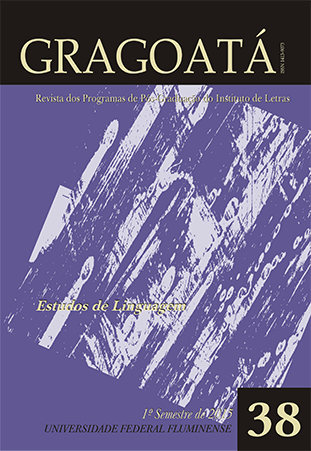ANALYSIS OF DISCURSIVE GENRES IN FORENSIC LINGUISTICS: A STUDY ABOUT FAKE KIDNAPPING SCAMS
DOI:
https://doi.org/10.22409/gragoata.2015n38a33301Keywords:
Fake Kidnapping Scams, Discursive genres, Semiolinguistic Theory.Abstract
Crimes of extortion called “Fake Kidnapping Scams” are a criminal modality that emerged few years ago in Brazil. As a new social practice, linked to it also emerged a new discursive genre. In this paper, we proposed to analyze and to describe this genre, based upon the Patrick Charaudeau’s Semiolinguistic Theory. Our analysis corpus was constituted by four recordings of “Fake Kidnapping Scams” intercepted by Rio de Janeiro’s Civil Police and provided through the online modality by Veja magazine. We realized that the communicative situations of the texts that composed our corpus were oriented to the common purpose of convincing victims to make the payment of the fake rescue, since the discursive target and the modes of discursive organization as well corroborated for this purpose. The discursive target make believe consists, in the analyzed texts, to make the victims believe in the supposed kidnappers’ arguments and, through coercion, threats and even instructions, criminals seek to make the victims make the payment requested. We also realized that the argumentative mode of discursive organization is the most prominent, being aided by the narrative and descriptive modes. Having, therefore, a specific finality, a social base in the homonymous criminal practice and having, also, own identities of the participating subjects of the interactional contract (kidnapper, kidnapped, victim-relative), we realized that the Fake Kidnapping Scams might be considered as an own discursive genre.
Downloads
Downloads
Published
Issue
Section
License
Authors who publish in Gragoatá agree to the following terms:
The authors retain the rights and give the journal the right to the first publication, simultaneously subject to a Creative Commons license CC-BY-NC 4.0, which allows sharing by third parties with due mention to the author and the first publication by Gragoatá.
Authors may enter into additional and separate contractual arrangements for the non-exclusive distribution of the published version of the work (for example, posting it in an institutional repository or publishing it in a book), with recognition of its initial publication in Gragoatá.

Gragoatá is licensed under a Creative Commons - Attribution-NonCommercial 4.0 International.











